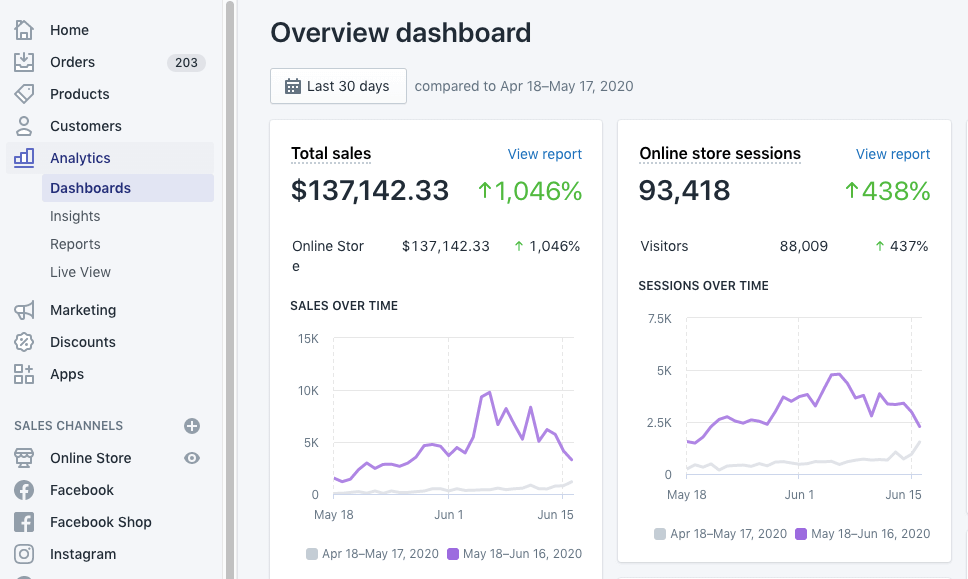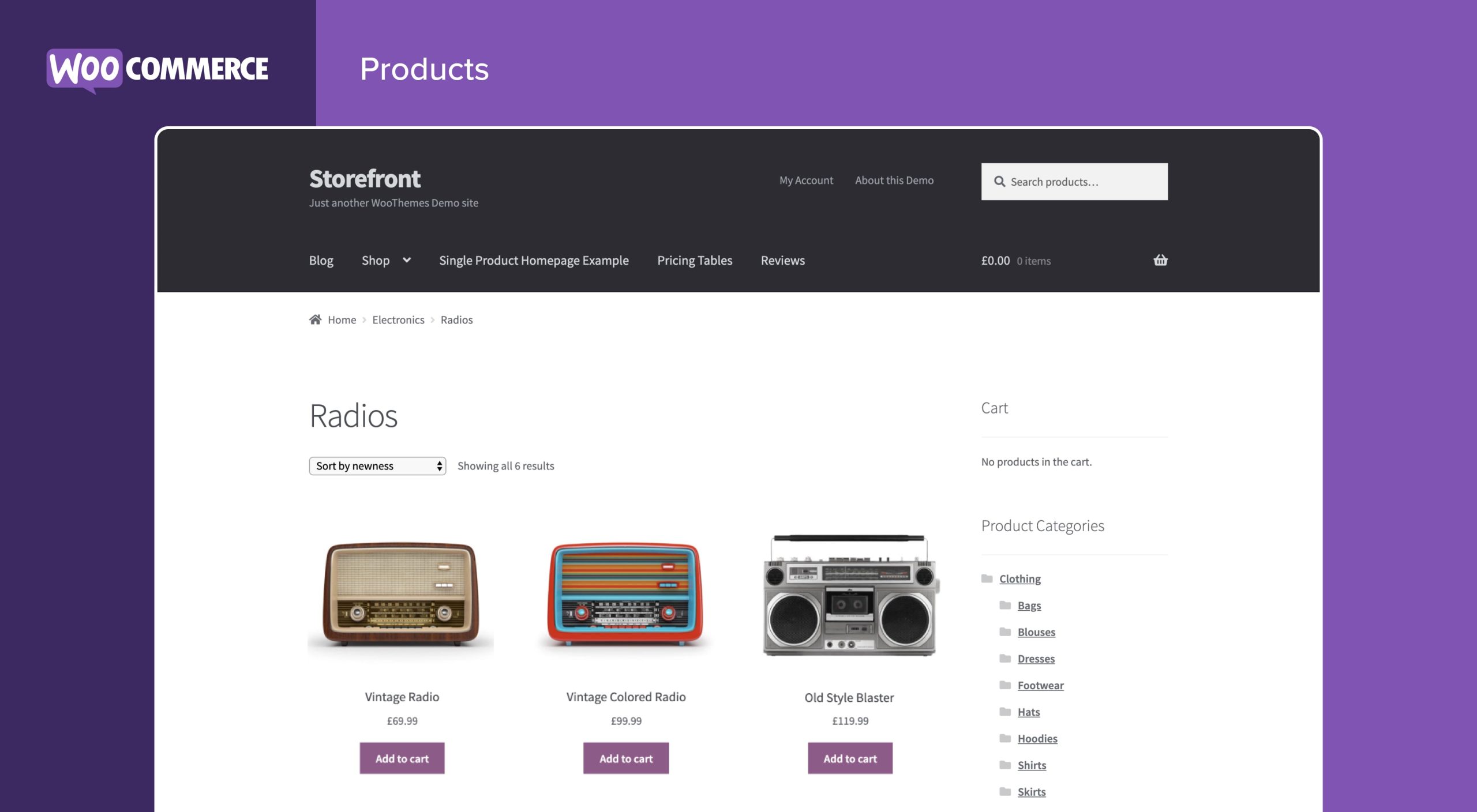As soon as you start doing research on creating an online store, the names Shopify and WordPress (or WooCommerce) start popping up. They’re amongst some of the most popular online store builders, and choosing between them, let alone the various other website builder options, can be daunting. Shopify is a popular option, but so is WordPress; plus, WordPress is an open-source Content Management System (CMS) that can do a lot more. Both platforms are fantastic for building eCommerce sites, but they’re also drastically different in terms of price, functionality, and ease of use.
It can seem almost impossible to decide between the two, as both Shopify and WordPress have their merits and pitfalls. Ultimately, which one is the right choice comes down to your specific needs and what matters most to you when building an eCommerce site. In this article, we’ll thoroughly explain the Shopify vs WordPress debate so you can make an informed decision about which one is best for your business.
What is WordPress?
WordPress is a content management system that allows online store owners complete control over their website’s customisation, hosting, and plugins. As a result of this high level of customisation and control, WordPress is the most popular content management system in the world – approximately 43% of websites in the world are powered by WordPress.
WordPress is an open-source software, meaning it’s free to use, modify and distribute. As a result, WordPress is home to a vibrant community of developers who are constantly creating new WordPress plugins and extensions, as well as WordPress themes. Most of these are free to use, and new ones are added every day, meaning WordPress is an extremely flexible way to build a website. The downside is that WordPress website owners have to pay for hosting, maintenance, and domain name registration from a third party.
It’s important to note that in this article and our website as a whole, we’re referring to WordPress.org instead of WordPress.com unless specified otherwise. WordPress.com is a pay-to-use website builder rather than an open-source content management system. If you’d like to learn about the difference between the two and the pros and cons of each, we covered it extensively in our article ‘WordPress.com Vs. WordPress.org – What’s The Difference?’
What is Shopify?
Shopify is an all-in-one platform that was founded in Canada in 2006 and has since gained a reputation as one of the best eCommerce website builders around. Shopify was designed to simplify the process of creating and managing an online store by bundling everything you need into one package. This includes web hosting, security, payment processing, and even inventory management.
Overall, Shopify is a popular option for business owners who don’t have the budget or tech knowledge to develop a custom website and are looking for a hassle-free solution for building an eCommerce site. However, the downside of Shopify is that website owners have to pay to use Shopify, and the website builder offers limited customisation options when compared to WordPress sites.
Choosing Between Shopify and WordPress
When choosing between any CMS or website builder, here are the top things to consider:
- Pricing and costs
- Ease of use
- eCommerce capabilities
- SEO and marketing power
- Level of control and customisation
- Customer support available
- Security
We’ll go over each other these considerations below and give a full comparison of Shopify vs WordPress to help you make up your mind! It’s important to take into account your specific needs and preferences – no website builder or CMS is perfect, so making a list of your priorities will help you assess which one works best for you.
Pricing and Costs
Pricing is one of the main differences between Shopify vs WordPress, and it’s a big one! Here’s how WordPress and Shopify stack up when it comes to your wallet:
Shopify Pricing and Costs
Shopify offers tiered pricing plans, each with different features and transaction fees. While the basic Shopify plan is relatively cheap at $56 AUD a month as of 2023, you’ll have to upgrade to pricier plans like Advanced Shopify for added functionalities like multiple staff accounts or third-party calculated shipping rates. You’ll also have to pay $14.95 per year for your domain name. Even taking into account what you save on third-party hosting costs, this results in a lot more money spent in the long term than WordPress. Here are the different Shopify plans:

WordPress Pricing and Costs
While the WordPress software itself is free, there’s still a variety of costs involved. These include:
- Hosting Costs: Unlike Shopify, WordPress requires you to arrange your own web hosting. WordPress hosting costs can range from affordable shared hosting plans to more expensive dedicated hosting, depending on your website’s size and traffic.
- Themes and Plugins: While there are thousands of free themes and plugins available, premium options often come with a price tag. These can enhance your website’s functionality and design but will add to your overall expenses.
- Development and Maintenance: If you’re not tech-savvy, you might need to hire a developer for initial setup or ongoing maintenance. This can be a one-time cost for setup or an ongoing expense for regular updates and troubleshooting.
- Additional Costs: Depending on your needs, you may incur additional costs for things like premium plugins for SEO, e-commerce functionalities, enhanced security, and backup solutions.
WordPress is known for its flexibility, but this can also mean variable costs. It’s best suited for those who want more control over their website and are willing to manage and pay for the associated responsibilities that come with it.
Ease of Use
Shopify Ease of Use
Shopify is designed with a focus on simplicity. Its user-friendly interface allows for straightforward setup of an online store, even for those with limited technical skills. The process of adding products, customising the store’s design, and managing daily operations like order processing and product updates is facilitated by intuitive tools and clear directions.
WordPress Ease of Use
WordPress, while offering more flexibility and customisation options, has a steeper learning curve. Setting up a site with WordPress means dealing with hosting, choosing themes, and integrating with third-party apps and plugins. The process can be overwhelming for beginners, especially if you want to custom-develop features or have issues that you need to troubleshoot. WordPress is great if you’re already comfortable with website development and ready to put in the elbow grease or are willing to outsource the process to experts, resulting in a more customised and powerful website overall.

eCommerce Features: Shopify Vs. WordPress Comparison
Shopify eCommerce Features
It’s all in the name: Shopify is an eCommerce platform designed specifically for online retail, and that comes with a lot of benefits for Shopify users. It offers a comprehensive set of built-in eCommerce tools that are ready to use out of the box, covering everything from product management to payment processing and shipping, making it easier to set up and run an online store.

Overall, Shopify is ideal if you’re looking for an eCommerce solution that’s straightforward to manage. However, this does come at a significant cost: Shopify charges a fee ranging between 1.4% to 2% of each transaction if you don’t use their integrated payment processing system, Shopify Payments, which can add up quickly and eat into your long-term profits.
WordPress and WooCommerce eCommerce Features
Setting up an eCommerce store in WordPress isn’t as straightforward as with Shopify, and you need to install a plugin like WooCommerce to sell products on a WordPress site. Although this may seem like an additional step tacked on to the already arduous process of creating an online store, it offers greater flexibility and control over the design and functionality of your store. Most eCommerce sites on WordPress are run using WooCommerce, and it’s widely considered the best eCommerce plugin on the market.

WooCommerce allows you to create themes suited to your brand and industry, optimise your checkout experience and create custom product pages quickly. One of the biggest advantages is that it’s completely free and open-source. This means that you won’t have to pay any transaction fees or other hidden costs that are associated with other eCommerce platforms like Shopify.
All up, while setting up an eCommerce store on WordPress might need you to go through some extra steps compared to other platforms, installing WooCommerce offers greater flexibility, control, and cost-effectiveness in the long run. WooCommerce was created by the founders of WordPress, so you know it’s legit!
SEO and Marketing
Shopify SEO and Marketing
Shopify has built-in Search Engine Optimisation (SEO) features and tools that make it relatively straightforward to optimise your Shopify stores for search engines. It offers basic SEO settings like editable meta titles and descriptions, automatic sitemap generation, and mobile-friendly themes. Shopify also provides integrated tools for email marketing, social media integration, and creating discount codes. However, for more advanced SEO and marketing needs, you might need to rely on third-party apps available in the Shopify App Store.
WordPress SEO and Marketing
WordPress offers you complete control over every aspect of your website’s SEO and access to thousands of free and paid SEO plugins – this is ideal if you like taking a more hands-on approach to SEO and don’t like leaving anything that important up to chance.
Using WordPress allows you to oversee every step of the development and design of your website, meaning you can make sure your website is as SEO-friendly as possible from the very start instead of relying on Shopify and its systems and tools. Additionally, the ability to choose a reliable hosting provider yourself and choose your hosting plan means you can get complete assurance your website is fast and reliable, both important factors for SEO.
Control and Customisation
Shopify Control and Customisation
Shopify offers a moderate level of control and a high level of ease of use. It provides a range of themes and an intuitive drag-and-drop editor that allows for basic customisation without needing extensive technical skills. However, there’s a limit to how much you can customise on Shopify without delving into more complex features like editing the platform’s Liquid code. Despite Shopify’s focus on eCommerce, this level of customisation isn’t the best for your online store. To stand out in the competitive environment of online shopping, it’s important your website is as custom as possible to match your branding and increase customer memorability.
WordPress Control and Customisation
As an open-source platform, WordPress offers users unparalleled control and customisation. You can modify essentially every element of your site with complete access to the code and thousands of themes and plugins – the possibilities are almost limitless. This level of control is ideal if you have a specific vision for their site or require custom functions that simple website builders can’t offer. However, this also means that taking full advantage of WordPress’s customisation potential often requires technical knowledge or the budget to outsource development to a professional or agency.
Customer Support

Shopify Customer Support
One of the things Shopify is most known for is stellar customer support. Shopify support includes a 24/7 phone line and live chat, meaning you can get instant support, even in the middle of the night. This 24/7 support is available no matter what type of plan you’re on. Shopify also has highly active forums, thanks to the millions of Shopify sites, and a help centre with helpful FAQs to answer any questions. In the WordPress vs Shopify debate, there’s a clear winner when it comes to customer support.
WordPress Customer Support
Open-source platforms like WordPress don’t offer any formal support service. However, there are 810 million WordPress websites out there, meaning there’s an incredibly vibrant community of WordPress users and experts offering up a wealth of information and WordPress training. While this isn’t the same as a dedicated phone line for 24/7 support, any information you need to know regarding WordPress eCommerce, the different versions of WordPress, or updating a WordPress plugin is definitely out there.
Security and Compliance
Shopify Security and Compliance
As a hosted platform, Shopify takes care of almost everything concerning the security of your website, including security updates and maintenance, as well as providing SSL (Secure Socket Layer) certificates for all its websites. This ensures that all customer data is encrypted during transactions. It’s also important to note that Shopify has to comply with PCI (Payment Card Industry) standards, which is essential for safely processing credit cards.

WordPress’ Security and Compliance
In contrast, security in WordPress is more hands-on. While the platform itself is secure, being open-source means that the responsibility of maintaining security largely falls on the user. This includes implementing your own SSL certificates, choosing secure payment gateways, and ensuring regular updates of the WordPress core, themes, and plugins. Additionally, the vast array of plugins means you’ll need to be cautious about what you install to avoid vulnerabilities.
Essentially, choosing WordPress means you need to take a proactive approach to security. This either requires some technical know-how on your part or the assistance of a professional.
Shopify Vs WordPress: Final Thoughts
If you’re still wondering whether to choose Shopify or WordPress, let’s break it down:
If you’re just starting out or if you need a simple, straightforward solution without much technical hassle, Shopify might be the better option. It’s tailor-made for ease of use, offering an all-in-one package that takes care of everything from hosting to security. This user-friendly approach allows you to focus more on running your business and less on the nitty-gritty of website management.
Overall, it’s a solid choice if you don’t yet have the technical skills or the budget for a custom-built website.
On the other hand, if you highly value customisation, flexibility, and having control over every aspect of your site, then creating an eCommerce site with WordPress and using WooCommerce is a better option. WordPress offers an unparalleled level of customisation, which can be a significant advantage for those looking to create a unique online presence. It’s well-suited for businesses that have specific requirements or those who plan to scale up significantly and need a platform that can grow and adapt with them.
In the end, the choice comes down to your individual business needs and what you want to get out of your website. They’re both great options on the whole – just make sure you take the time to do your research and make a clear list of your priorities before jumping in.




